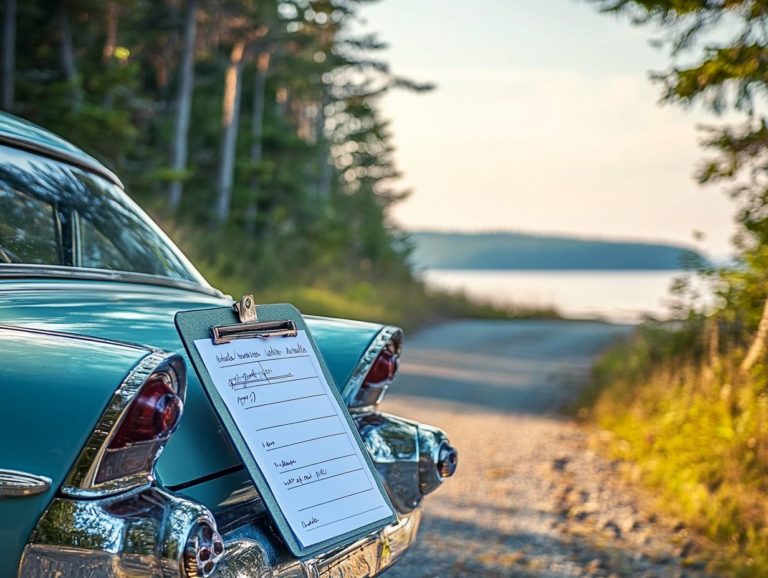Oregon’s Auto Insurance Requirements Simplified
Navigating auto insurance requirements in Oregon may seem daunting, but grasping these essentials is crucial for every driver.
You ll encounter everything from mandatory coverage to optional add-ons, all of which shape your insurance experience.
This article will clarify the minimum liability coverage you need, delve into additional options available to you, and examine the factors that influence your premiums.
It will also underscore the repercussions of driving without insurance and offer you valuable tips for securing affordable coverage.
Stay informed to protect yourself on the road!
Contents
- Key Takeaways:
- Understanding Auto Insurance Requirements in Oregon
- Minimum Liability Coverage in Oregon
- Additional Coverage Options
- Factors Affecting Auto Insurance Rates in Oregon
- Penalties for Driving Without Insurance in Oregon
- Tips for Finding Affordable Auto Insurance in Oregon
- Frequently Asked Questions
- What are the minimum requirements for auto insurance in Oregon?
- Is it mandatory to have auto insurance in Oregon?
- Are there any additional auto insurance requirements in Oregon?
- What is the average cost of auto insurance in Oregon?
- Can I use my out-of-state auto insurance in Oregon?
- Are there any penalties for not having auto insurance in Oregon?
Key Takeaways:

- Oregon requires all drivers to have minimum liability coverage to legally operate a vehicle.
- Additional coverage options, such as collision and comprehensive, can provide extra protection for your vehicle.
- Factors such as your driving record and the type of car you drive can impact your auto insurance rates in Oregon.
Understanding Auto Insurance Requirements in Oregon
Understanding auto insurance requirements in Oregon is essential for you as a driver seeking to uphold your financial responsibility and legal rights.
In Oregon, specific car insurance regulations are in place to ensure that every vehicle operator carries the appropriate coverage, safeguarding both themselves and others on the road.
The Division of Financial Regulation oversees these requirements, which include mandatory liability coverage and the necessity of proof of insurance.
Neglecting to comply can result in significant penalties and jeopardize your driving privileges.
Overview of Mandatory Coverage
In Oregon, the mandatory car insurance coverage includes bodily injury liability and property damage liability, ensuring you are financially protected should an accident occur.
These required coverage types are your safety net, providing security for you as the driver at fault and for the individuals involved. This showcases the state s commitment to financial responsibility.
Under Oregon law, the minimum limits for bodily injury liability are set at $25,000 per person and $50,000 per accident, while property damage liability must be at least $20,000.
Having proof of insurance isn t merely a legal obligation; it s a crucial shield against unexpected costs that accidents can bring.
Neglecting these insurance requirements can lead to hefty penalties, including fines, license suspension, and increased financial liabilities.
Minimum Liability Coverage in Oregon
In Oregon, it s essential for drivers to maintain minimum liability coverage to safeguard against financial loss in the event of an accident.
This coverage includes important limits for both bodily injury and property damage liability, ensuring that you re protected while on the road.
Limits and Requirements
The required liability limits for minimum coverage are set at $25,000 for bodily injury per person, $50,000 for total bodily injury per accident, and $20,000 for property damage.
These limits are essential for safeguarding your personal assets and ensuring financial accountability in the event of an accident.
In situations like hit-and-runs or encounters with uninsured motorists, having adequate coverage becomes even more vital.
If you find yourself in a hit-and-run, those liability limits will dictate the amount of financial support available for covering medical expenses and property damage.
Likewise, if you re involved in an accident with an uninsured driver, these limits ensure that you can still receive compensation for your losses, protecting your financial stability and assets from unexpected liabilities.
Additional Coverage Options

In addition to the essential minimum liability coverage, you have a range of premium options at your disposal to enhance your car insurance policy in Oregon.
Consider adding collision coverage, comprehensive coverage, and personal injury protection (PIP). This last option covers medical expenses for you and your passengers regardless of fault, elevating your protection and peace of mind on the road.
Don t leave your financial future to chance! Get the right coverage today!
Types of Optional Coverage
Optional coverage types in Oregon include collision coverage, which takes care of vehicle damage after an accident, and comprehensive coverage, which provides protection against non-collision-related incidents like theft or natural disasters.
These optional coverages significantly enhance your overall financial security, ensuring you re better equipped to handle any unexpected expenses that may arise from car accidents.
You also have the option of personal injury protection (PIP), which covers medical expenses for injuries sustained in an accident, regardless of who s at fault. This is particularly important, as it can alleviate the financial burden of medical bills and lost wages while you re on the mend.
Another crucial type of coverage is uninsured motorist protection. This coverage helps you if you’re in an accident with someone who doesn t have insurance.
Factors Affecting Auto Insurance Rates in Oregon
Numerous factors can profoundly influence auto insurance rates in Oregon. The type of vehicle you drive, your driving history, and the specific coverage options you choose all play a pivotal role in determining your monthly costs and premiums.
Each element intricately weaves into the overall tapestry of what you ll ultimately pay.
What Determines Your Premium?
In Oregon, several key factors determine your auto insurance premium, including your driving record, insurance history, and the type of vehicle you choose. Each element plays a significant role in how insurers assess risk.
If you have a clean driving record, it signals lower risk to insurance companies, which could lead to reduced premiums. Conversely, a history filled with frequent accidents or claims might result in higher rates, as insurers perceive you as more likely to file future claims.
The type of vehicle you drive also matters. If you own a high-performance or luxury model, you may find yourself facing elevated premiums due to the increased costs associated with repairs or replacements. Therefore, these factors not only impact your immediate coverage options but also have lasting implications for your overall insurance affordability and accessibility.
Penalties for Driving Without Insurance in Oregon
Driving without insurance in Oregon can expose you to significant penalties, including hefty fines and the possibility of legal action. This reflects the state s unwavering commitment to ensuring financial responsibility among all its drivers.
Consequences and Fines

For first-time offenders, fines can soar up to $500. If you re a repeat offender, you can expect even heftier amounts and the very real risk of losing your driving privileges.
If you find yourself in the habit of driving uninsured, those fines will only become steeper with each violation. The state might also require you to engage in mandatory community service or attend educational programs aimed at reinforcing responsible driving and understanding insurance laws.
Repeated infractions could even result in a suspension of your driving privileges for extended periods. This can significantly disrupt your ability to commute for both work and personal commitments. Over time, these violations can lead to skyrocketing insurance premiums, making it increasingly difficult to find affordable coverage down the line.
Tips for Finding Affordable Auto Insurance in Oregon
Looking for affordable auto insurance in Oregon? Here are some quick tips! Finding affordable auto insurance requires a strategic mindset. It s essential to engage in comparison shopping, actively seek out available discounts, and clearly understand the factors influencing your premiums.
By taking these steps, you can navigate the insurance landscape with confidence and secure the best coverage at a price that suits your budget. Don t wait start comparing your options now to save money!
How to Save on Your Premium
To save on your auto insurance premium in Oregon, consider fine-tuning your coverage options and taking full advantage of available discounts.
Enhancing your driving habits can lower your risk profile. One effective strategy is to increase your deductibles, which can lead to significant reductions in your monthly payments.
Bundling your auto policy with other types of insurance, like homeowners or renters, often results in substantial savings. You can also improve your driving skills by enrolling in safe driving courses, which not only boost your skills but may also qualify you for additional discounts.
Make sure to explore the various discounts insurers offer; many companies provide reductions for features such as anti-theft devices or for maintaining a clean driving record. By researching and understanding these options, you can easily uncover ways to cut costs on your premiums.
Frequently Asked Questions
What are the minimum requirements for auto insurance in Oregon?
In Oregon, you need at least $25,000 for bodily injury per person, $50,000 per accident, and $20,000 for property damage.
Is it mandatory to have auto insurance in Oregon?

Yes, it is mandatory for all drivers in Oregon to have auto insurance. Driving without insurance can result in fines and penalties.
Are there any additional auto insurance requirements in Oregon?
Yes, Oregon also requires drivers to have Personal Injury Protection (PIP) coverage, which covers medical expenses and lost wages for the driver and their passengers in the event of an accident.
What is the average cost of auto insurance in Oregon?
The average cost of auto insurance in Oregon is around $1,300 per year. However, the cost can vary depending on factors such as your driving record, age, and the type of car you drive.
Can I use my out-of-state auto insurance in Oregon?
No, if you are a resident of Oregon, you are required to have auto insurance that meets the state’s minimum requirements. If you are moving to Oregon from another state, you will need to switch to an Oregon policy.
Are there any penalties for not having auto insurance in Oregon?
If you drive without insurance, you may be responsible for any damages or injuries caused in an accident. Driving without insurance in Oregon can result in fines of up to $1,000 and suspension of your driver’s license and vehicle registration.
Don’t miss out on potential savings! Get a quote today and see how much you can save!




